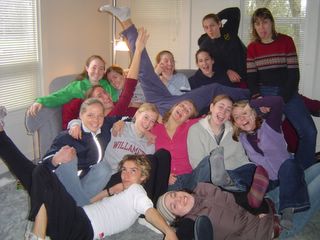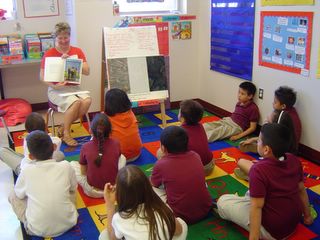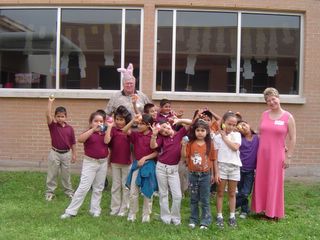Monday, April 18, 2005
Intercambio
My friend John (an Americorps volunteer living in the colonias) set me up with an "intercambio" (or language exchange partner). Nasaria is a 39-year old mother of two who lives in the colonias (sub-standard housing community) with her husband, mother-in-law, horse, rooster, rabbit, and chicken. She works at the women's leadership center (that John helps coordinate) teaching ESL classes to pre-K children. We meet together at her house on the weekends for a couple hours to read and talk....she practices her English and I practice my Spanish. She reads a children's book to me in English, I help her with difficult words, then we translate it into Spanish together. We also read together her social security paperwork (in English) and then translated it...that was tough! She is so excited when she translates something correctly or learns a new word! Next, we're going to translate an English recipe to Spanish and cook together. Nasaria helps me improve my vocabulary and understand cultural idioms.
During our first "intercambio," she explained to me that although her husband works at their ranch in Reynosa, MX (nearby city on "la frontera"), she can't go there to help. I immediately knew why, but to my surprise she openly explained that she's waiting for legalization papers that should clear in couple months, until then...no Mexico visits or no return to her home. Anyway, she's invited me to visit the ranch in the future...so that should be fun!
Inmigration
The topic of inmigration came up a month ago in social studies. This offered the perfect means of gaining more insight into my own students' immigration issues. Our textbook only referred to inmigrants coming from China to CA or Germany to NY, so I explained that inmigrants can also travel from south to north. This sparked an enlightening conversation; with little leading, my students began sharing their own stories of crossing the Rio Grande River. Five or so of my children have swam across the river-either by themselves, clinging to their mother's back, or propped abover their father's head. They told me (and their classmates) stories of run-ins with Border Patrol and parental deportations. One of my adorable little boys lives with his grandparents and cousins in Texas because his parents are unable to legally cross and illegal crossings have only resulted in deportation, yet his parents want him to receive education in the US. In social studies we learned that people inmigrate in search of "mas libertades." But, this student said, "Miss...that's not the reason my mom wanted to come here; she just wanted to take care of me when I was sick." Later when we were reviewing the word "inmigrante" for our comprehensive six weeks test, another students proudly stated, "Like me Miss, because I swam across the Rio on my father's back."
During most of these class discussions I just sat back and listened, wide-eyed. It was an incredible experience to have a roomful of children openly and excitedly sharing their (arguably controversial) personal stories while their classmates respectfully listened. My roommates (who are all sixth grade teachers) explained to me that by students get to their grade level they have been socially conditioned to not talk about their inmigration experiences.....very interesting.
One student's definition of "inmigrantes" (inmigrants): "senores que la policia arrestan" (Men that the police arrest).
Home Visits
Home Visits
In efforts of controlling my often unruly second graders, I frequently visits their homes-with or without advanced notice. Often these visits are necessary because my students don't have telephones at home. I've been to about seven of my 26 students' houses; some houses I've visited 4 plus times over the school year. Some houses have broken screens hanging off the windows and stink of cat urine and are surrounded by flies, others are in federally subsidized complexes with clothing lines and blow-up wading pools in the common back yard shared with 5 other families, still others are well kept and new. I most commonly speak Spanish on these home visits (or a Tex-Mex mix of English and Spanish). One time, I actually had a student's cousin offer to translate to English for me because she was afraid her grandma (my student's legal guardian) would not fully understand me! I reassurred her that I could explain the student's behavior in English or Spanish (or any necessary combination). :)
My most recent home visit lasted an hour and was a true test of my Spanish flueny. I was meeting with a mother (pregnant, may I add) whose daughter, while high-achieving, is a repeated behavior problem in my class. For most of the conversation it was 2-on-1 (disgrunteled mother and student vs. newbie teacher). While being questioned about my classroom policies and strict rules ("my daughter is only in 2nd grade, she should have the liberty to speak out in class without raising her hand"), I held my ground and defended myself. Somewhere between living in Spain (unsuccessful refutation with my host mom) and now, I've gained the communication skills to debate...in Spanish. Also, in this home visit, I constantly switched back and forth addressing my student and her mother, thus I learned that I am improving my ability to quickly change between "tu" (informal) and "usted" (formal) forms....yay! So, while this home visit was difficult, it was great because I was forced to really use my Spanish in a more unfamiliar setting.










